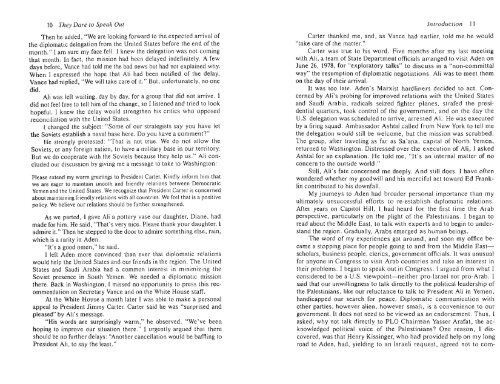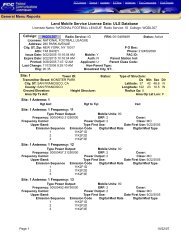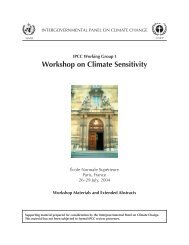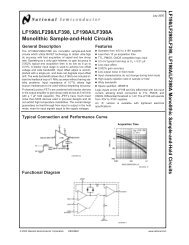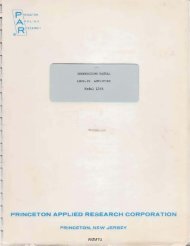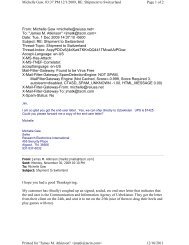They Dare to Speak Out
They Dare to Speak Out
They Dare to Speak Out
Create successful ePaper yourself
Turn your PDF publications into a flip-book with our unique Google optimized e-Paper software.
10 <strong>They</strong> <strong>Dare</strong> <strong>to</strong> <strong>Speak</strong> <strong>Out</strong><br />
Then he added, "We are looking forward <strong>to</strong> the expected arrival of<br />
the diplomatic delegation from the United States before the end of the<br />
month." I am sure my face fell. I knew the delegation was not coming<br />
that month. In fact, the mission had been dela yed indefinitely, A few<br />
days before, Vance had <strong>to</strong>ld me the bad news but had not explained why.<br />
When I expressed the hope that Ali had been notified of the delay,<br />
Vance had replied, "We will take care of it." But, unfortunately, no one<br />
did.<br />
Ali was left waiting, day by day, for a group that did not arrive. I<br />
did not feel free <strong>to</strong> tell him of the change , so I listened and tried <strong>to</strong> look<br />
hopeful. I knew the delay would strengthen his criti cs who opposed<br />
reconciliation with the United States.<br />
I changed the subject: "S ome of our strategists say you have let<br />
the Soviets establish a naval base here. Do you have a comment?"<br />
He strongly protested: "That is not true. We do not allow the<br />
Soviets, or any foreign nation, <strong>to</strong> have a military base in our terri<strong>to</strong>ry.<br />
But we do cooperate with the Soviets because they help us." Ali concluded<br />
our discussion by giving me a message <strong>to</strong> take <strong>to</strong> Washing<strong>to</strong>n:<br />
Please extend my warm greetings <strong>to</strong> President Carter. Kindly inform him that<br />
we are eager <strong>to</strong> maintain smooth and friendly relations between Democratic<br />
Yemenand the United States. We recognize that President Carter is concerned<br />
about maintaining friendly relations with all countries. We feel that is a positive<br />
policy. We believe our relations should be further strengthened.<br />
As we parted, I gave Ali a pottery vase our daughter, Diane, had<br />
made for him. He said , "That's very nice. Plea se thank your daughter. I<br />
admire it." Then he stepped <strong>to</strong> the door <strong>to</strong> admire something else, rain,<br />
which is a rarity in Aden.<br />
"It's a good omen," he said .<br />
I left Aden more convinced than ever that diplomatic relations<br />
would help the United States and our friend s in the region . Th e United<br />
States and Saudi Arabia had a common interest in minimizing the<br />
Soviet presence in South Yemen. We needed a diplomatic mission<br />
there. Back in Washing<strong>to</strong>n, I missed no opportunity <strong>to</strong> press this recommendation<br />
on Secretary Vance and on the White House staff.<br />
At the White House a month later I was able <strong>to</strong> make a personal<br />
appeal <strong>to</strong> President Jimmy Carter. Carter said he was "surprised and<br />
pleased" by Ali's message.<br />
"His words are surprisingly warm," he observed. "We've been<br />
hoping <strong>to</strong> improve our situation there." I urgently argued that there<br />
should be no further delays: "Another cancellation would be baffling <strong>to</strong><br />
President Ali, <strong>to</strong> say the least."<br />
Introduction 11<br />
Carter thanked me, and, as Vance had earlier, <strong>to</strong>ld me he would<br />
"take care of the matter."<br />
Carter was true <strong>to</strong> his word. Five months afte r my last meeting<br />
with Ali, a team of State Department officials arranged <strong>to</strong> visit Aden on<br />
June 26, 1978, for "explora<strong>to</strong>ry talks" <strong>to</strong> discuss in a "non-committal<br />
way" the resumption of diplomatic negotiations, Ali was <strong>to</strong> meet them<br />
on the day of their arrival.<br />
It was <strong>to</strong>o late. Aden's Marxist hardliners decided <strong>to</strong> act. Concerned<br />
by Ali's probing for improved relations with the United States<br />
and Saudi Arabia, radicals seized fighter planes, strafed the presidential<br />
quarters, <strong>to</strong>ok control of the government, and on the day the<br />
U.S. delegation was sc heduled <strong>to</strong> arrive, arrested Ali. He was executed<br />
by a firing squad. Ambassador Ashtal called from New York <strong>to</strong> tell me<br />
the delegation would still be welcome, but the mission was scrubbed.<br />
The group, after traveling as far as Sa'ana, capital of North Yemen,<br />
returned <strong>to</strong> Washing<strong>to</strong>n, Distressed over the execution of Ali, I asked<br />
Ashtal for an explanation. He <strong>to</strong>ld me, "It's an internal matter of no<br />
concern <strong>to</strong> the outside world,"<br />
Still, Ali's fate concerned me deeply. And still does. I have often<br />
wondered whether my goodwill and his merciful act <strong>to</strong>ward Ed Franklin<br />
contributed <strong>to</strong> his downfall.<br />
My journeys <strong>to</strong> Aden had broader personal importance than my<br />
ultimately unsuccessful efforts <strong>to</strong> re-establish diplomatic relations.<br />
After years on Capi<strong>to</strong>l Hill, I had heard for the first time the Arab<br />
perspective, particularly on the plight of the Palestinians. I began <strong>to</strong><br />
read about the Middle East, <strong>to</strong> talk with experts and <strong>to</strong> begin <strong>to</strong> understand<br />
the region. Gradually, Arabs emerged as human beings.<br />
The word of my experiences got around, and soon my office became<br />
a s<strong>to</strong>pping place for people going <strong>to</strong> and from the Middle Eastscholars,<br />
business people, clerics, government official s. It was unusual<br />
for anyone in Congress <strong>to</strong> visit Arab countries and take an interest in<br />
their problems. I began <strong>to</strong> speak out in Congress. I argued from what I<br />
considered <strong>to</strong> be a U.S . viewpoint-neither pro-Israel nor pro-Arab. 1<br />
said that our unwillingness <strong>to</strong> talk directly <strong>to</strong> the political leadership of<br />
the Palestinians, like our reluctance <strong>to</strong> talk <strong>to</strong> President Ali in Yemen,<br />
handicapped our search for peace. Diplomatic communication with<br />
other parties, however alien, however small, is a convenience <strong>to</strong> our<br />
government. It does not need <strong>to</strong> be viewed as an endorsement. Thus, I<br />
asked, why not talk directly <strong>to</strong> PLO Chairman Yasser Arafat, the acknowledged<br />
political voice of the Palestinians ? One reason, I discovered,<br />
was that Henry Kissinger, who had provided help on my long<br />
road <strong>to</strong> Aden, had, yielding <strong>to</strong> an Israeli request, agreed not <strong>to</strong> com-


